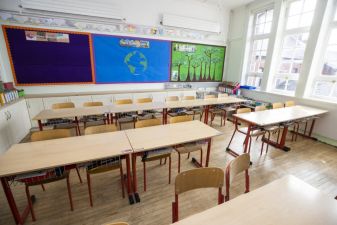School children who are close contacts of Covid-19 cases would no longer have to self-isolate if they showed no symptoms, under changes being considered by health officials.
With the testing system coming under extreme pressure as 14,000 children have been deemed close contacts of cases, public health specialists are pressing for a relaxation of rules that require them to stay home for at least 10 days.
The change would apply to asymptomatic children who are not vaccinated, according to The Irish Times.
Internal documents drawn up for the National Public Health Emergency Team (Nphet) over the summer warn the current mass testing regime has negative effects that must be balanced out as vaccines reduce harm.
These include “medicalising daily life in ways that may have significant social consequences”, citing the exclusion of children from school as an example.
Vaccinated children are already exempt from the requirement to restrict their movements if they become a close contact, but only children aged 12 and over can be immunised.
Consideration is also being given to testing children earlier in the self-isolation period so they could return to the classroom earlier. Longer restriction periods would continue in situations of greater risk, such as some forms of special education.
Nphet meeting

It is unlikely a decision will be made immediately, as no meeting of Nphet is scheduled for this week. The rules applying to testing and isolation of schoolchildren date from early in the pandemic and do not take account of widespread vaccination.
On Tuesday, Minister for Health Stephen Donnelly acknowledged the “big imposition” of isolation requirements, noting public health teams were keeping testing protocols under review. “If they were to advise me and advise government on shortening, then that’s something we can look at.”
Labour’s education spokesman, Aodhán Ó Riordáin, said safe ways to revise the system should be considered. He said schools were being forced to make their own decisions on exclusions.
A spokesman for the Department of Education said the HSE carried out risk assessments when a case was confirmed, and that support was provided to schools, including a dedicated helpline for principals.







